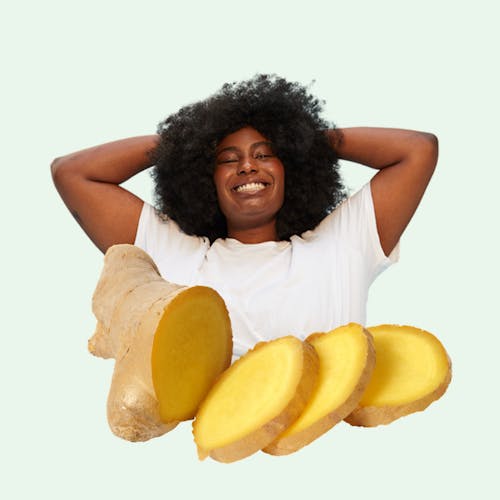This website uses cookies to enhance the user experience. By using Yoppie you are agreeing to our use of cookies.
Coeliac Disease & Your Menstrual Cycle
Written by Yoppie
10 May 2021
What is coeliac disease?
Why is gluten so evil?!
What are the symptoms?
How can coeliac disease affect your period?
Can a gluten-free diet reduce period pain?
What about fertility?
Should you be worried?
If you are affected by coeliac disease, you may be wondering how the condition relates to your menstrual cycle. Does it affect your period? Does it cause PMS to flare up? We’re answering all your questions here. Let’s go…
What is coeliac disease?
If you’re reading this blog, we’re guessing you already know at least a little about coeliac disease. Maybe you suffer from it yourself, you know someone who does, or you’ve discovered that your body is somewhat gluten intolerant (as opposed to allergic) - whatever your reasons for being here, let’s start with a quick overview of what this disease actually is.
Coeliac disease is an autoimmune condition where the immune system essentially “attacks” its own tissues when gluten is consumed. It can damage the small intestine and make it so that you are unable to absorb nutrients. This can cause many different symptoms like diarrhoea, pain in the abdomen, and excessive bloating.
Why is gluten so evil?!
It’s not, for most of us. But for someone with coeliac disease, gluten causes a reaction in the body. It’s a protein found in wheat, barley and rye, and these are typically found in foods like pasta, bread, cereal, and a lot of ready meals and snacks.
According to Coeliac.org.uk, approximately 1 in 100 people (that’s hundreds of thousands here in the UK) suffer with coeliac disease, and an estimated half a million struggle with unexplained symptoms that could relate to coeliac.
What are the symptoms?
If you suffer from coeliac disease and have experienced the symptoms that come with eating gluten, you’ll know that they vary for each person and can also differ in intensity. Some of the most common symptoms that arise from eating foods containing gluten are;
- Diarrhoea or constipation
- Stomach aches or indigestion
- Bloating and flatulence
- Fatigue as a result of lack of nutrients from food
- Unintentional weight loss
- Itchy rashes (dermatitis herpetiformis)
… and more.
How can coeliac disease affect your period?
OK, on to the period-y stuff. It may not seem like the two would be related, but there are undoubtedly connections between this disease and the menstrual cycle.
Studies have found those with coeliac disease reported period-related issues like irregular and light periods, spotting, and sometimes very heavy or even painful periods.
It is thought that undiagnosed coeliac disease could cause skipped periods, otherwise known as amenorrhea, due to the consumption of gluten. In rare cases, this can also lead to young people getting their first period later than they normally would. It’s for this reason that some doctors will test people with amenorrhea for coeliac disease. The good news is once a diagnosis of coeliac disease has been reached, a gluten-free diet can be implemented to get that menstruation back to normal function.
Can a gluten-free diet reduce period pain?
If a gluten-free diet can help regulate the cycles of people with coeliac disease, it would be fair to assume that perhaps removing gluten from your diet (even if you don’t suffer from coeliac) could help with any period issues you have, right?
Well, there isn’t much research on how this diet change affects menstrual pain, but one study on reproductive issues in women with coeliac disease found that almost half reported period pain before being diagnosed, while only 32% of non-coeliac sufferers reported this. In other words, those with coeliac who were eating gluten had more period pain than those without coeliac. The study didn’t cover whether or not a gluten-free diet could improve menstrual cramps in general, but anecdotal evidence has suggested eating a gluten-free diet could be helpful for those with extremely painful periods. Well that’s… something?
What about fertility?
Interestingly, associations have been made between coeliac disease and fertility issues. Studies have found that the possibility of someone having coeliac is rarely taken into account when fertility is in question. In fact, it’s estimated that approximately 7.4-14% of women in the US have fertility issues, and when hormonal and anatomical causes are ruled out, an estimated 15% of these fertility issues are attributed to unexplained factors.
We’re talking about issues like amenorrhea, menstrual irregularities, and iron deficiency, but sometimes there are no symptoms at all, meaning there’s a chance the problem could be undiagnosed coeliac disease. In fact, studies show that coeliac disease may affect as many as 4-8% of women with unexplained fertility problems.
It’s also been suggested that those with coeliac disease could be fertile for a shorter period of time than those without, as they may begin menstruation later and experience an earlier menopause. This is often due to altered hormonal levels or the lower BMI associated with a lack of absorbed nutrients.
Should you be worried?
At the end of the day, coeliac disease does not appear to pose a greater risk to fertility when treated, so if this is a concern to you, visit your GP to discuss your options. Also, if you have not been diagnosed with coeliac disease but you have experienced some of the symptoms mentioned above, it’s worth asking your GP to check if there could be a connection.
Have you got a question about how coeliac disease can affect your cycle? We’re all ears! Shout out in our private Facebook group or drop us a note on Insta @itsyoppie. Don't forget that our personalised period box can get organic tampons, PMS supplements and more delivered easily and regularly through your letterbox, so you can give a period regime change a go before worrying about cutting all that pasta and bread on the reg!
Section jump
Back to top
Subscribe To Our Newsletter
YOPPIE





© 2026 Yoppie is a registered trademark of Phlo Technologies Ltd.
Yoppie's supplements are not a substitute for a varied diet and healthy lifestyle and are not intended to diagnose, treat, or cure any disease. If you are pregnant, breastfeeding, have a medical condition or are under medical supervision, please consult with your doctor before taking any of our products.






